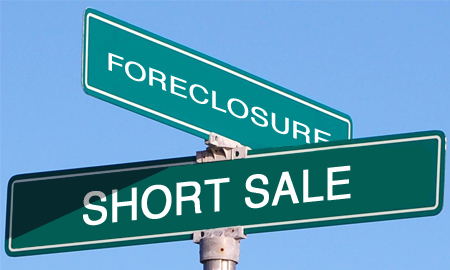
26 May The Difference Between Short Sales, Pre-foreclosures, and Foreclosures
I hear a number of people, from investors to agents to sellers, mix up these terms and situations. I will clarify the meanings while providing some insights on how to buy each.
Definitions
Short Sale (per REALTOR® Magazine): A short sale occurs when the net proceeds from the sale of a home are not enough to cover the sellers’ mortgage obligations and closing costs, such as property taxes, transfer taxes, and the real estate practitioner’s commission. The seller is unwilling or unable to cover the difference.
Pre-Foreclosure (per Investopedia): Pre-Foreclosure refers to the legal situation a property is in during the early stages of being repossessed. Reaching pre-foreclosure status begins when the lender files a default notice on the property, which informs the property owner that the lender will pursue legal action toward foreclosure if the debt isn’t paid.
Foreclosed Home (per BankofAmerica.com): Also called a real estate owned (REO) property. An REO property is owned by the lender as a result of the previous owner defaulting on the loan. This is also known as a foreclosure property or a bank-owned property.
Below I explain situations that sometimes cause confusion.
Not all short sales are pre-foreclosures. A seller can be current on their mortgage loan, yet upside down on the value. While some lenders require a borrower to be behind on their mortgage by 30 to 90 days before considering a short sale approval, I have worked on short sales in which the seller was not in default or the lender did not yet initiate legal proceedings.
Not all owners in pre-foreclosure are sellers. Just because someone is in default on their mortgage loan does not mean they wish to sell their house. Some borrowers are still trying to obtain a loan modification or forbearance plan. Some simply refuse to sell, perhaps out of embarrassment, apathy, or out of a belief they can find a way to make the loan current again.
Not all foreclosures are bank-owned properties. If someone successfully buys a property at a foreclosure auction, the house is still foreclosed yet it never became owned by the bank. I once had a bank offer to sell me a mixed-use building after the foreclosure auction but before the Sheriff’s Deed was filed in the bank’s name. I knew an investor who wanted the building, and so I facilitated a sale in which the bank directed the Sheriff to file the deed in the investor’s company name. That way the bank never owned the property, even though they had foreclosed.
A short sale is not a bank-owned property, and therefore the bank is not the seller. A successful short sale happens before a foreclosure auction. The bank is not the seller. The bank merely has the authority to consider and potentially approve taking a lesser amount. The real estate purchase contract is between the buyer and the seller, and the bank is not a party to the contract.
Not all pre-foreclosure properties end up being foreclosed. Sometimes the owner sells the property, and sometimes the owner finds a way to make the loan current. Sometimes the owner and the bank agree to a deed-in-lieu of foreclosure, which is also known as a friendly foreclosure. I, for one, am happy to see borrowers find a way to keep their home. If you are in a pre-foreclosure situation regardless of whether you wish to keep your home or sell it, please communicate with your lender consistently.
A seller in pre-foreclosure who has equity can simply sell their house as a traditional sale.This is known as a make-whole pre-foreclosure sale, in that the bank and other lienholders are paid in full. In most states, the seller does not even have to disclose that they are behind on their mortgage. I once entered into a contract to purchase a three-unit building for $67,000. A couple of days before the closing, the title company informed me that a foreclosure auction was scheduled for the following week. The seller and listing agent did not disclose that the seller was close to being foreclosed, nor were they required to do so. I was not bothered by it at all. At the closing, the seller received about $5,000 in proceeds. His Realtor® did a good job in helping him sell the property before it was foreclosed.
A make-whole pre-foreclosure sale can become a short sale over time.
Just because a seller in pre-foreclosure has equity at one moment does not mean they will have equity by the date of the proposed closing. When a seller is in default on their mortgage, the outstanding balance can grow rapidly as legal fees, accrued interest, and late charges are added. I have seen a number of situations in which the mortgage balance grew so large that the seller ran out of equity before the settlement.
Below are some pros and cons of buying each type of distressed sale.
Pros of Buying a Short Sale
- In most states, once you are under contract no one else has the right to buy the property. This reduces competition.
- If the short sale is approved, you will receive clean title at the closing.
- You have the opportunity to conduct inspections.
- The property is typically in better condition than a foreclosure.
Cons of Buying a Short Sale
- There is a lot of uncertainty involved, as it may take months to find out if the lender will approve the short sale.
- While waiting for months, you could miss out on other opportunities.
- It’s possible that the lender responds months later with a counteroffer for a higher price that you are not willing to pay.
- If you pay for a home inspection yet never receive approval for the short sale at your price, then you would have paid to know all about a house you cannot buy.
- If the seller, seller’s negotiator, or lender fail to do their part, the short sale negotiation could go nowhere.
Pros of Buying a Pre-Foreclosure That is Not a Short Sale
- There will be clean title.
- It is just like a traditional sale.
Cons of Buying a Pre-Foreclosure That is Not a Short Sale
- If the mortgage balance grows fast, by the time the closing is set to occur the seller might not be able to clear title.
Pros of Buying a Foreclosure
- Typically the property sells at a significant discount to the fair market value.
- There will be clean title.
Cons of Buying a Foreclosure
- Inspections may not be allowed or inspections may be difficult to perform if the utilities are off or there are broken pipes and fixtures.
- The condition of the property may limit the types of acceptable financing.






No Comments